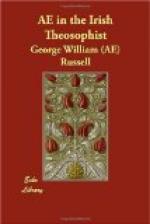That we are living in the Dark Age we all know, yet we do not realise half its darkness. We endure physical and moral suffering; but, fortunately or unfortunately, we are oblivious of the sorrow of all sorrows—the Spiritual Tragedy. Such a rust has come over the pure and ancient spirit of life, that the sceptre and the diadem and the starry sway we held are unremembered; and if anyone speaks of these things he is looked at strangely with blank eyes, or with eyes that suspect madness. I do not know whether to call him great, or pity him, who feels such anguish; for although it is the true agony of the crucifixion, it is only gods who are so martyred. With these rare souls memory is not born: life flows on, and they with it go on in dreams: they are lulled by lights, flowers, stars, colours, and sweet odours, and are sheltered awhile from heaven and hell; then in some moment the bubble bursts, and the god awakens and knows himself, and he rises again with giant strength to conquer; or else he succumbs, and the waves of Lethe, perhaps in mercy, blot out his brief knowledge.
I knew such an one many years ago, and I tell of him because I know of no deeper proof of the existence of a diviner nature than that man’s story. Arthur Harvey, as I have heard people describe him, in his early years was gentle, shy, and given to much dreaming. He was taken from school early, came up from the country to the city, and was put to business. He possessed the apathy and unresisting nature characteristic of so many spiritual people, and which is found notably among the natives of India; so he took his daily confinement at first as a matter of course, though glad enough when it was over, and the keen sweet air blew about him in spring or summer evenings, and the earth looked visionary, steeped in dew and lovely colour, and his soul grew rich with strange memories and psychic sensations. And so day-by-day he might have gone on with the alternation of work and dream, and the soul in its imaginings might never have known of the labours of the mind, each working by habit in its accustomed hour, but for an incident which took place about two years after his going to business.
One morning his manager said: “Harvey, take this letter; deliver it, and wait for an answer.” He started up eagerly, glad for the unwonted freedom from his desk. At the door, as he went out, the whole blinding glory of the sunlight was dashed on him. He looked up. Ah! what spaces illimitable of lustrous blue. How far off! How mighty! He felt suddenly faint, small, mean, and feeble. His limbs trembled under him: he shrank from the notice of men as he went on his way. Vastness, such as this, breaking in upon the eye that had followed the point of the pen, unnerved him: he felt a bitter self-contempt. What place had he amid these huge energies? The city deafened him as with one shout: the tread of the multitude; the mob of vehicles; glitter and shadow; rattle,




